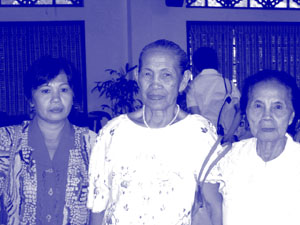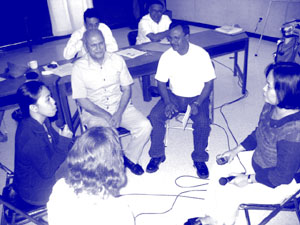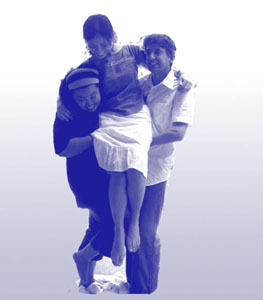|

EDITORIAL
COVER STORY
- A Precious Gift to Humanity
INTERNATIONAL SOLIDARITY
- The Other Side of the Kingdom
- Convention Now!
AFAD FEDEFAM
Together Now!
- Tying the Future with the Past
- Getting Back on Track
INTERNATIONAL LOBBY
- Still Fighting
- In Memory of the Disappeared
- The Power
of One
PHOTO ESSAY
- Protect All Persons From Enforced Disappearances
NEWS FEATURES
- Building on Nilo’s Legacy
- Filipinos Fight Against Disappearances
- Justice Suspended
- The Munir Murder
- Another Case of Impunity
STATEMENTS
/REPRINTS
- FEDEFAM Statement...
- An Open Statement to the GRP and NDFP Panels ...
- Parvez Imroz’ Award...
Asian Federation Against Involuntary Disappearances
Asian Federation Against Involuntary Disappearances
Asian Federation Against Involuntary Disappearances
Asian Federation Against Involuntary Disappearances
Asian Federation Against Involuntary Disappearances
Asian Federation Against Involuntary Disappearances
Asian Federation Against Involuntary Disappearances
Asian Federation Against Involuntary Disappearances
Asian Federation Against Involuntary Disappearances
Asian Federation Against Involuntary Disappearances
Asian Federation Against Involuntary Disappearances
Asian Federation Against Involuntary Disappearances
Asian Federation Against Involuntary Disappearances
Asian Federation Against Involuntary Disappearances
Asian Federation Against Involuntary Disappearances
Asian Federation Against Involuntary Disappearances
Asian Federation Against Involuntary Disappearances
Asian Federation Against Involuntary Disappearances
Asian Federation Against Involuntary Disappearances
Asian Federation Against Involuntary Disappearances
Asian Federation Against Involuntary Disappearances
Asian Federation Against Involuntary Disappearances
Asian Federation Against Involuntary Disappearances
Asian Federation Against Involuntary Disappearances
Asian Federation Against Involuntary Disappearances
Asian Federation Against Involuntary Disappearances
Asian Federation Against Involuntary Disappearances
Asian Federation Against Involuntary Disappearances
Asian Federation Against Involuntary Disappearances
Asian Federation Against Involuntary Disappearances
Asian Federation Against Involuntary Disappearances
Asian Federation Against Involuntary Disappearances
Asian Federation Against Involuntary Disappearances
Asian Federation Against Involuntary Disappearances
Asian Federation Against Involuntary Disappearances
Asian Federation Against Involuntary Disappearances
Asian Federation Against Involuntary Disappearances
Asian Federation Against Involuntary Disappearances
Against Involuntary Disappearances |
|
INTERNATIONAL LOBBY: |
|
|
by Mia Corazon Aureus |
|
|
Still Fighting |
|
The abolition
of the United Nations Commission on Human Rights early this year caused
much alarm among human rights organizations advocating for the people’s
Right Not to be Disappeared. This move cut the euphoria brought about by
the victorious adoption of the Draft International Convention for the
Protection of All Persons from Enforced or Involuntary Disappearances in
September 2005 as it threatened to suspend all actions on the said
instrument. It left NGOs working twice more than their previous efforts to
ensure the inclusion of the text in the agenda of the first session of the
new Human Rights Council. It left hope among the families of the
disappeared waning.
Re-strategizing lobbying efforts
 In
anticipation of the shifts in the operation and correspondence in the
multilateral system governing member-states of the United Nations, members
and partner organizations of the Asian Federation Against Involuntary
Disappearances regrouped for a lobby training session at the Development
Academy of the Philippines, Tagaytay, on 6-8 May 2006. Delegates from
IKOHI (Indonesia), KontraS (Indonesia), OPFMD (Sri Lanka), TJC
(Pakistan), FIND (Philippines), APDP (Kashmir), Non-Violence International
(Thailand), We Remember (Belarus), FEDEFAM (Latin America), and
Linking Solidarity (The Netherlands), together with trainer and lawyer
Cecilia Jimenez from Geneva, Switzerland, reviewed and evaluated the
accomplishments over the past years. They assessed the current situation
and discussed possible lobbying strategies to meet the goal of having the
Convention adopted by the UN Human Rights Council (HRC). And they set
immediate objectives in preparation for the June session. In
anticipation of the shifts in the operation and correspondence in the
multilateral system governing member-states of the United Nations, members
and partner organizations of the Asian Federation Against Involuntary
Disappearances regrouped for a lobby training session at the Development
Academy of the Philippines, Tagaytay, on 6-8 May 2006. Delegates from
IKOHI (Indonesia), KontraS (Indonesia), OPFMD (Sri Lanka), TJC
(Pakistan), FIND (Philippines), APDP (Kashmir), Non-Violence International
(Thailand), We Remember (Belarus), FEDEFAM (Latin America), and
Linking Solidarity (The Netherlands), together with trainer and lawyer
Cecilia Jimenez from Geneva, Switzerland, reviewed and evaluated the
accomplishments over the past years. They assessed the current situation
and discussed possible lobbying strategies to meet the goal of having the
Convention adopted by the UN Human Rights Council (HRC). And they set
immediate objectives in preparation for the June session.
Form an international
coalition for the Convention;
Convince
the non-committal countries within the HRC from all continents to
support the convention by June 2006;
Convince own government
(meaning governments of the respective delegates) to support the
Convention; and
Mobilize
the victims to be at the forefront of the campaign.
Jimenez highlighted three components of the "strategy
circle" that must be considered in planning the lobby activities. She
stressed the importance of (1) knowing one’s self [or the
organization/Federation], (2) knowing the targets, and (3) knowing the
terrain.
She said that it is imperative to recognize the
importance and the contribution of each constituent. Families, for whom
the Convention is mainly for, provide the strongest impact. Needless to
say, they belong at the forefront of the campaign.
Furthermore, understanding and defining the identity of
each of these members and partners are also vital in addressing the team’s
internal dynamics. To launch activities upon uneven grounds can cause
strain to the coordination of the group and more importantly, to its
social cohesion.
Secondly, targets need to be identified. It will
provide direction to every activity planned. More, it will help maximize
resources effectively. Thus, states were mapped out into committed,
non-committed and opposed categories. Focus must be on countries that
still need much convincing regarding the importance of the treaty to the
families’ lives and the peoples’ protection, in general.
Last, it is crucial to study the playing field of all
actors in the bid for the Convention’s adoption. Players need to observe
and track the changes in the UN. The group painted the possible scenarios
that could happen to equip themselves with enough plans and strategies to
handle the actual decisions of the UN body later on.
Strengthening national lobbying
However, the UN is not the only playing field.
Governments in their respective countries are key players as well. Farooq
Niazi of the Truth and Justice Commission rightly pointed out the need to
lobby and campaign in one’s own country as no international force can just
change the attitude of an administration that is against the Convention.
Indeed, even if the General Assembly adopts the drafted text, its
implementation relies heavily upon the government which would ratify it.
AFAD Secretary General Aileen Bacalso hoped to have
more concrete actions in the national level to convince the governments to
support the Convention and propel them to start the process of enacting
national laws criminalizing enforced disappearances.
Jimenez further warned that the group must also ensure
that states which would ratify must be evenly distributed among the
regions. She said that when more states from Latin America or Europe, for
example, ratify the Convention, other states tend to refuse to sign it for
the reason that "it is only a Latin American problem" or "it is a European
thing." Polarization of ratifications to a region can negate the principle
of universality and leave the Convention useless to countries which need
it the most.
Calling for more support
 In
line with AFAD’s efforts to do concrete actions in the national level, it
gathered on 11 May 2006 at the UP Balay Kalinaw, a general audience
of families of the disappeared, civil society members, media people,
government officials, diplomats, and others, for a public forum on the
Convention.
Speakers who graced the event were Hon. Loretta Anne
Rosales of the Akbayan partylist and former chair of the Committee
on Human Rights, Cecilia Jimenez, Maria Adela Antokoletz of FEDEFAM,
Irina Krasovskaya of We Remember-Belarus, and Suciwati, wife of the late
AFAD Chairperson, Munir.
Antokoletz discussed two reasons of enforced
disappearances in America but may nonetheless apply in other countries.
Under the international context, she placed much responsibility for this
act upon US imperialism and its global campaign against terrorism. US, she
said, began a world campaign of domination upon countries that produce oil
and other energetic and wealthy resources. More, its crusade against
terrorists cultivated an environment of enforced disappearances, torture,
extrajudicial killings, etc.
In the local context based on Latin America’s
experience, "dictatorships have taught ways of living, formed ways of
thinking, deepened authoritarian trends and created conditions to strongly
install a new-liberal savage economic system." She shared that the
consequences of a dictatorship endure more in time than the dictators
themselves. "We in Latin America have to work against those consequences
for several generations," she stressed.
 Krasovskaya,
founder of We Remember-Belarus, spoke well from experience coming from a
country governed by the said "last dictator of Europe." She brought forth
three components to raise the effectiveness of actions against enforced
disappearances. First, she called on everyone to unite and show the world
that "we are the real power that makes all dictatorial regimes collapse.
This is the power of our unlimited love for our loved ones." She proposed
forming an international coordination center which will bring together
organizations from different countries dealing with this issue and round
up the force to create a stronger impact. This, then, would entail
implementing a permanent international campaign program to create a more
informed public which can battle the myths propagated by perpetrators with
knowledge. Third is the need to set up a collective security system that
aimed to prevent more disappearances and protect families of the
disappeared from further abuses.
All for the families
With all these at hand, Krasovskaya called on
everyone’s support as "only our joint activities can raise the problem of
involuntary disappearances to the level which will enable us to get closer
to learning the truth about our loved ones and restore justice and rule of
law."
These efforts indeed helped bring the people another
step closer to truth and justice. In June 2006, strategies paid off when
by consensus, members of the HRC approved the adoption of the Convention.
(See related story.)
Euphoria again followed the session of the HRC. The
question is, however, will this jubilation be sustained by the General
Assembly come November 2006? Or will it be cut again?
For now though, everyone is basking in the glory of a renewed hope and
spirit. And whatever may come in the succeeding months, these human rights
organizations are prepared to pursue truth and justice in the name of all
those who disappeared and their families. Whatever happens, this fight
shall go on.
|
|
On 15 March 2006, the United Nations General Assembly
passed a resolution which spelled the death of the United Nations
Commission on Human Rights but gave birth to the Human Rights Council.
This move put human rights on a higher institutional standing. It is now
considered as a subsidiary organ of the GA, leveled with peace and
security as well as with development. Contrary to the previous years when
the CHR was placed under the Economic and Social Council, the resolution
has finally given due recognition to HR as one of the pillars of UN’s
work. |
|
FUNCTIONS
1. Conduct promotion of HRE, advisory services,
technical assistance and capacity building with the consent of Member
States concerned;
2. Serve as a forum for dialogue and thematic issues;
3. Make recommendations to the GA with respect to
international HR law (standard-setting);
4. Promote full implementation of HR obligations and
follow-up of the goals from the UN conferences and summits;
5. Undertake a periodic review based on objective and
reliable information;
6. Prevent human rights violations and respond promptly
to human rights emergencies; and
7. Assume the roles and responsibilities of the
Commission on Human Rights relating to the work of the Office of the High
Commissioner on Human Rights.
Source: Forum Asia’s Asian Campaign on the Human Rights Council, "The
Human Rights Council: Challenges and Opportunities for NGOs," 17 March
2006 |
|
Nevertheless, this decision to abolish the Commission
was instigated by the need to rid the UN body of corruption and
inefficiency to implement its functions and provide responses to many
human rights issues. It had long been criticized of double standards and
selectivity which allowed gross human rights violators to sit in the
Commission to protect themselves and their allies from scrutiny and
punishment for their own human rights abuses. Consequently, these problems
seriously degraded the institution’s credibility.
Thus, much is expected from the new Council in carrying
out its mandates and functions guided by the principles of universality,
impartiality, objectivity and non-selectivity, constructive dialogue and
cooperation.
Downsized from 53 to 47 member countries, the Council
held its election on 9 May 2006. Distribution of members among the
different regions was based on the percentage of membership in the GA.
Elected members have a three-year term. Re-election is not allowed for
those who have already served two consecutive terms.
Election was ideally based on the candidates’ human
rights records as well as on their voluntary pledges and the commitments
they have made. Considering the body’s new function to undergo periodic
review, those members who would be proven to have done gross and
systematic violations can now be suspended from the Council. All member
states will now be held accountable for their actions. |
|
ELECTED HRC MEMBERS |
|
ASIA
1. India
2. Indonesia
3. Bangladesh
4. Japan
5. Malaysia
6. Pakistan
7. South Korea
8. China
9. Jordan
10. Philippines
11. Bahrain
12. Saudi Arabia
13. Sri Lanka |
AFRICA
1. Ghana
2. Zambia
3. Senegal
4. South Africa
5. Mali
6. Mauritius
7. Morocco
8. Gabon
9. Djibouti
10. Cameroon
11. Tunisia
12. Nigeria
13. Algeria |
|
LATIN AMERICAN & CARIBBEAN STATES
1. Brazil
2. Argentina
3. Mexico
4. Peru
5. Guatemala
6. Uruguay
7. Cuba
8. Ecuador |
WESTERN EUROPE & OTHER STATES
1. Germany
2. France
3. United Kingdom
4. Switzerland
5. The Netherlands
6. Finland
7. Canada |
|
EASTERN EUROPE
1. Russia
2. Poland
3. Czech Republic
4. Azerbaijan
5. Ukraine
6. Romania |
Source: Forum Asia’s Asian Campaign on
the Human Rights Council, "The Human Rights Council: Challenges and
Opportunities for NGOs," 17 March 2006 |
|
Mia Corazon Aureus is a Journalism graduate who has dedicated her
writing for the causes of civil society. After three years of working for
the urban poor as a research assistant of the Institute on Church and
Social Issues (ICSI), she now works as the Campaign Officer of AFAD. |
| The
Voice |
Vol. VI No.1 November 2006 |
|